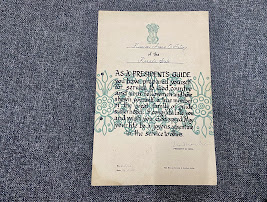November 1965. The second India-Pakistan war had ended.
Mankind had yet to conquer the moon. A group of schoolgirls (seven of them from
Infant Jesus, Aranattukara) take a train from Thrissur, Kerala, to India’s
capital to receive the President’s Guide Award from Sarvepalli Radhakrishnan.
Annie and her friend Jolly are among the wide-eyed teenagers on the trip, chaperoned
by two nuns. It takes three days on the train to cross India’s hinterlands. The
girls are thrilled by the unexpected vistas and smile shyly at the handsome soldiers
in the railway carriage.
In New Delhi, they camp in tents alongside other
awardees from across the country and take baths, albeit reluctantly, at dawn. Unaccustomed to the winter chill, Annie borrows a spare
sweater.
The girls wolf down chapatis paired with spicy cauliflower. For the seven Keralites
- Annie, Jolly, Thresiamma, Kochuthresia,
Elsy, Alphonsa and Sybil - it is their first taste of the north Indian flatbread.
At a grand ceremony at the Rashtrapati Bhavan, the schoolgirls are ushered to the carpeted dais by liveried footmen. The president says something to her but Annie doesn’t register it, nervous and stunned by the flashbulbs going off.
From their camp in Delhi, the schoolgirls travel to Agra, some 150 miles away, for their first glimpse of the Taj Mahal, the monument of love. And all too soon, it is time for the train back home.
They find themselves heroes when they set foot in Kerala. Feted with flowers and firecrackers at the Thrissur railway station and taken to school in a convoy of jeeps festooned with garlands.
Giddy with excitement, the girls whoop with delight as the parade of jeeps goes past Tharakan’s, their rival boys-only school in Aranattukara that hasn’t won an award. At Infant Jesus, the school nuns lead them to a feast and a parade in their honour.
The rest of the school year, and then another, goes by in a blur. Annie takes her national school-leaving examinations and on a summer day in 1967, her parents arrive, taking her and her trunk back with them to their dwelling in Maninagar, Ahmedabad.
This is not the age of the internet, nor are landline telephones common yet. No mailing addresses exchanged either, their naïve minds haven’t thought of it. Annie and Jolly drift apart, their once unshakable bond now a dissolving thread as time and distance take their toll.
March 2023. Annie, who now calls Delhi home, visits her school in Thrissur 56 years after she left with her parents. Tucked away in a home for nuns, a building where she lodged for ten years as a pupil, she chances upon an old woman who recognises her.
Mary, the cook for boarding school pupils, cups Annie’s face in her hands in disbelief and sheds tears of joy. She retired just a few years ago, when her frail body could no longer keep up with her constant fussing over the young girls who studied there.
Mary, now 88, hasn’t forgotten Annie or her shenanigans in this cradle of four
walls where she grew up among nuns, and where Annie has returned more than half
a century later for another memorable day at her alma mater.
A wave of nostalgia comes over her as Annie gazes at the older buildings and
gardens, including a rocky nook where several decades ago the resident ducks
had quacked and chased the seven-year-old, pecking at the hem of her skirt with
their beaks, until a nun had rescued her.
The school’s nuns from the 1960s are long dead, but Annie wonders if she could still
meet her friends. And Jolly, who is also a distant relative. A cousin comes to Annie’s
aid, tracking down a WhatsApp number for Jolly, who has settled in nearby Irinjalakuda
after marriage.
The long-lost friends speak on the phone, promising to meet in person when
Annie visits Kerala. Both have relatives in the suburb of Ollur, Thrissur, and coordinate
a rendezvous coinciding with the Feast of Saint Raphael at one of India’s
oldest churches.
October 2023. Annie and her son (yours truly) brave the sun as devotees holding
aloft golden crosses and ceremonial umbrellas trudge past in a procession. Jolly
lingers by the entrance to her daughter’s house. Celebratory fireworks go off as
the long-lost friends reunite.
The words come thick and fast, tumbling out as if it is just an interrupted
conversation, not a six-decade hiatus. Both say it is like they have never been
apart. Annie and Jolly have been rekindling their friendship ever since.


















